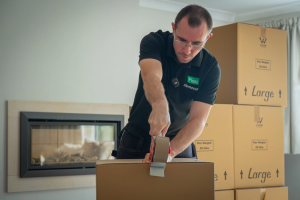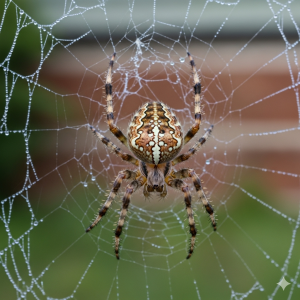How to Keep Spiders Out of Your Home: A Complete Guide for UK Homeowners

As Autumn arrives in the UK, many homeowners notice an unwelcome increase in eight-legged visitors scuttling across their floors and lurking in corners. Whilst spiders play a vital role in controlling other pests, most of us would prefer they stay outdoors where they belong. The good news is that with the right approach, you can significantly reduce the number of spiders entering your home, without resorting to harmful chemicals.
Understanding Why Spiders Enter Your Home
Before tackling prevention methods, it is important to understand what draws spiders indoors. During autumn months, particularly September and October, male spiders venture out in search of mates, often wandering into our homes by accident. They are also attracted to warm, dry spaces as temperatures drop, seeking shelter from the British weather.
Spiders are primarily hunting for food, which means if your home has plenty of flies, mosquitoes, or other small insects, you are likely to attract more spiders. Poor housekeeping, excessive moisture, and easy entry points all contribute to making your property more appealing to these arachnids.
Natural Prevention Methods
The most effective spider deterrents are often the simplest and most environmentally friendly. Essential oils top the list of natural repellents that actually work. Peppermint oil is particularly effective – simply mix 10-20 drops with water in a spray bottle and apply around windowsills, door frames, and other potential entry points. Tea tree oil, eucalyptus oil and lavender oil work similarly well and leave your home smelling fresh.
Vinegar serves as another excellent natural deterrent. Create a solution using equal parts white vinegar and water, then spray it around areas where you have noticed spider activity. The strong scent disrupts their sensory navigation, encouraging them to seek alternative locations.
Citrus peels scattered around your home can also deter spiders. Save your orange, lemon and lime peels and place them near windows, in corners and around doorways. Replace them weekly to maintain their effectiveness.
Physical Barriers and Home Maintenance
Prevention begins with making your home less accessible to spiders in the first place. Conduct a thorough inspection of your property’s exterior, paying particular attention to cracks in walls, gaps around windows and doors, and spaces where pipes enter the building. Use caulk or weatherstripping to seal these entry points – even tiny gaps can accommodate surprisingly large spiders.
Install door sweeps on all external doors, ensuring they make complete contact with the threshold. Check and repair any damaged window screens, as these provide an obvious route for spiders and their prey to enter your home.
Keep vegetation trimmed back from your house exterior. Shrubs, ivy and overhanging branches create highways for spiders to access your home’s upper levels. Maintain at least a foot of clear space between plants and your building’s walls.
Reducing Spider Food Sources
The most sustainable way to control spider populations is to eliminate their food supply. This means addressing other pest issues in your home, as spiders will naturally relocate if they cannot find adequate prey.
Regular hoovering is crucial, particularly in corners, under furniture, and around skirting boards where insects tend to congregate. Pay special attention to areas near windows and doors where flies and other insects are commonly found. Empty your hoover bag or canister frequently, as insects can survive inside for extended periods.
Address moisture problems promptly, as many insects thrive in damp conditions. Fix leaky pipes, ensure proper ventilation in bathrooms and kitchens, and use dehumidifiers in particularly humid areas of your home. Robust drainage around your property’s exterior also reduces insect breeding grounds.
Strategic Cleaning and Decluttering
Spiders appreciate undisturbed spaces where they can build webs and hunt undisturbed. Regular cleaning disrupts these areas and removes egg sacs before they can hatch. Focus on areas that are often overlooked: behind furniture, in wardrobes, under beds and in storage areas.
Reduce clutter throughout your home, particularly in basements, lofts and spare rooms. Cardboard boxes, old magazines and rarely used items create perfect hiding spots for spiders. When storage is necessary, use sealed plastic containers rather than cardboard boxes.
Dust regularly with a microfibre cloth, which captures spider eggs and small insects more effectively than traditional dusting methods. Pay particular attention to light fixtures, as these attract flying insects that spider’s prey upon.
Lighting Considerations
Your home’s lighting can inadvertently attract spiders by first attracting their food sources. Outdoor lights, particularly those near doors and windows, draw flying insects that spiders then follow indoors.
Consider switching to yellow or sodium vapour bulbs for exterior lighting, as these are less attractive to insects. Position lights away from doorways and windows when possible and ensure outdoor fixtures are properly sealed to prevent insects from getting trapped inside.
Indoor lighting should also be considered. Turn off unnecessary lights, particularly in rooms that are not being used, and consider using blackout curtains to prevent indoor light from attracting insects to windows.
When to Seek Professional Help
While these methods are highly effective for most situations, some spider infestations may require professional intervention. If you are dealing with large numbers of spiders, have identified potentially dangerous species, or have underlying structural issues that you cannot address yourself, it is worth consulting a pest control professional.
Look for companies that offer integrated pest management approaches, focusing on long-term prevention rather than simply applying chemical treatments. A good professional will identify the root causes of your spider problem and provide comprehensive solutions.
Maintaining Your Spider-Free Environment
Consistency is key to keeping spiders at bay. Establish a regular cleaning routine, inspect and maintain your property’s exterior seasonally, and reapply natural deterrents monthly or as needed.
Remember that completely eliminating spiders from your environment is not realistic or necessary – they serve important ecological functions. The goal is simply to encourage them to fulfil these functions outside your home rather than in your living spaces.
With patience and persistence, these methods will significantly reduce the number of spiders in your home, allowing you to enjoy your living space without unexpected eight-legged encounters.





